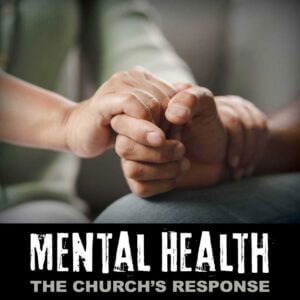Project HELP
Project HELP is an initiative of WMU that identifies a critical issue and seeks to raise the level of awareness of that issue and provide practical approaches anyone can implement to open the door for meeting needs and sharing the gospel.
Since the launch of Project HELP in 1994, WMU has focused on a variety of critical issues affecting the lives of millions including hunger, poverty, human exploitation, PTSD, and refugees.
Each Project HELP focus usually lasts 2–4 years. This timeframe gives churches time to raise awareness of the critical issue in their congregations, study the prevalence and impact of the issue in their communities and region, and determine how best to go about meeting the needs of those impacted by the issue while opening doors to share the gospel with other community workers as well as those in need.
Project HELP: Mental Health (2022–26)
What Is Mental Health?
Mental health is a state of mental well-being that enables people to cope with the stresses of life, realize their abilities, learn well and work well, and contribute to their community.¹
Why Focus on Mental Health?
As Christians, we are called to encourage those around us with the love of Christ, walk alongside them through difficult seasons, and help them know the Lord is near.
God created humans with an innate need for one another. Community is an invitation to participate in life together, complete with all the differences that make us who we are as unique beings.
Though many in the local church can appreciate community in theory, its implementation and practice are often a different story. Many people experiencing mental health challenges and/or living with mental illness can testify to this fact
Mental illness is simultaneously overlooked and often stigmatized in local church settings. According to Scott McConnell, executive director of Lifeway Research, a 2021 survey showed that “While preaching on mental illness is the norm and even more pastors feel their church is responsible to help the mentally ill, still 37% of pastors rarely or never bring it up from the pulpit.”²
This culture of silence must change for us to experience the community and connection God desires for us in the local church.
What Can We Do?
As Christians, we can uniquely respond to and support people experiencing mental health challenges. We can compassionately respond to their physical needs, encourage them to seek help for their mental and emotional needs, and share with them how to satisfy their spiritual needs through the eternal hope found in Jesus Christ.
But how? Where do we start?
That’s where Project HELP: Mental Health comes in.
Through Project HELP: Mental Health, WMU provides multiple avenues for churches to raise awareness of mental health as a critical issue in all of our lives and equip members to lead and champion mental health initiatives both in the church and in local communities.
Check out our current resources below!
Mental Health First Aid (Training)
Mental Health First Aid
Mental Health First Aid (MHFA) is a skills-based training course that teaches you how to help people who are developing a mental health problem or experiencing a mental health crisis. The training helps you identify, understand, and respond to signs of addictions and mental illness.
Just as CPR helps you assist an individual having a heart attack, Mental Health First Aid helps you assist someone experiencing a mental health or substance use–related crisis.
In the MHFA course, you learn risk factors and warning signs for mental health and addiction concerns, strategies for how to help someone in both crisis and noncrisis situations, and where to turn for help.
MHFA for Adults Training Information
National WMU is offering multiple opportunities for you to participate in the virtual MHFA for Adults.
MHFA for Adults training is specifically for providing mental health first aid to adults (not youth or children) and is for adult participants only.
The MHFA for Adults course costs $100 per person. Cost includes registration fee and print copy of the MHFA Adult Manual which will be mailed to you by WMU.
Participants are required to complete all 3 parts of the training:
- self-guided online course prework (takes about 2 hours to complete, must be completed before course date)
- instructor-led training (dates/times listed below)
- self-guided online course completion work (takes about 30 minutes to complete)
After all training has been completed, you will officially be certified as a Mental Health First Aider and receive a certificate.
MHFA for Adults Course Registration
Course dates listed below are the dates when the instructor-led portion of the training will take place. Course prework must be completed prior to the course date.
To register for a MHFA for Adults course through WMU, you must register through the course date link below.
Each course date listed below links to an online registration form for that particular date. The registration form includes your payment. The form is for individual registration only.
If you would like to register groups to go through MHFA for Adults training or have any questions, contact us at compassionministries@wmu.org
Registrations ends 1 month prior to the training date or when the training class is full. Virtual training classes are limited to 15 people and in-person training classes are limited to 30 people.
Course Date Registration Links
VIRTUAL: October 7–8, 2025Registration Closed- VIRTUAL: February 24–25, 2026 (8:30 a.m. to 12:30 p.m. CT) — This virtual MHFA training takes place on 2 consecutive days. Participation on both days is required. — Click here to register
Don’t see a training date available that works for you? Click here to get on the waitlist! We will email you if space becomes available for current training opportunity and when future training dates are added.
Mental Health: The Church's Response Online Course

Do you want to learn more about the critical issue of mental health? Are you looking for effective ways to respond to those struggling with mental health challenges or to equip your church to address mental health within your congregation and community?
Take the online course Mental Health: The Church’s Response to discover more about mental health and ways to help those with mental health struggles.
You will be equipped with ongoing access to resources for leading a conference about mental health such as a PowerPoint presentation, presentation notes, flyers, and posters.
You will have 30 days from the day you register to complete the course, and will receive a link that will never expire for access to teaching resources that are updated periodically.
Joyful Sorrow: Breaking Through the Darkness of Mental Illness (Book)

When darkness suffocates, look for the light. Desperation and suicide cases are rising at an alarming rate, with suicide being a leading cause of death in the US.
For Christians, particularly those in vocational ministry, the stigma surrounding mental illness and mental health challenges often creates an atmosphere of secrecy. But when science and religion mingle in the recovery of a believer, not only are minds stabilized, but true hope is found.
Julie Busler understands the pain of mental illness and has learned trials not only humanize us but also increase our capacity to be used by God. In Joyful Sorrow, she invites us into her journey, where a mental breakdown took her from being a missionary to a suicidal patient in a Turkish psychiatric hospital. With vulnerability and grace, Julie walks readers through how to find help and hope and demonstrates that even in the sorrow of mental illness, joy can coexist.
Multiplying Hope
As a ministry based on principles of orality, Multiplying Hope uses experiential learning and storytelling to help people internalize and share God’s redemptive stories.
Learn more about this ministry and how you can get involved at multiplyinghope.org.
Blogs on Mental Health
Mental Health Blog Series
Walking alongside and supporting people experiencing mental illness requires a basic understanding of what they may be going through so as to be able to respond appropriately. As with all physical illness, various types of mental illness require different types of intervention, care, and support.
Our Mental Health Blog Series will help you get started learning about various mental illnesses and how individuals and churches can support people experiencing mental health challenges.
The blogs in this series are either written by Christian mental health professionals or reviewed by them prior to publication.
Each month during the Project HELP: Mental Health initiative, we’ll be posting a new blog. Blogs will be linked here as they are added. Follow us on Facebook and Twitter @nationalwmu for links to the blogs as they post!
Understanding Mental Health
- Mental Health and the Church: A Look at Ways the Church Can Promote Mental Health
- Opening Our Minds: The Church and Mental Health
- Warning Signs: What to Do When You Are Concerned about Another’s Mental Health
- Depression: Finding Support in the Struggle
- Coping with Anxiety Disorders: Talking Openly about Mental Health
- The Reality of Eating Disorders: An Interview with an Eating Disorder Specialist
- Zero to One Hundred: Symptoms, Diagnosis, and Treatment of Bipolar Mood Disorder
- Working Together: How to Support and Care for Those Living with Autism Spectrum Disorder
- Postpartum Depression: While the Symptoms Can Be Overwhelming, There Is Hope
- Living with Post-Traumatic Stress Disorder: Finding Hope in the Darkness
- Consistency Is Key: Walking Alongside a Person with a Personality Disorder
- Obsessions and Compulsions: What Is Obsessive-Compulsive Disorder?
Stories of Living through Mental Health Challenges and Crises
- Navigating Mental Health in the Workplace: Three Positive Responses
- Good Kids Struggle Too: A Missionary Kid’s Experience with Counseling
- When Hope Is Gone, Can the Loss of Purpose be Far Behind?
- Joyful Sorrow: One Woman’s Story of Breaking Through the Darkness of Mental Illness
- Be Anxious for Nothing: Surrender the Fight
- Discipling People with Mental Health Challenges
- Experiences with Autism Spectrum Disorder: Encouragement for Families and Churches
- Trusting God: A Testimony of God’s Work through the Depths of Depression and Anxiety
- Peace Is Possible: Living with PTSD
- Good Grief: Working through Significant Losses
- A Testimony of Hope: Walking with Our Son as He Battles OCD
Navigating Life Events in Mentally Healthy Ways
- Healing through Heartache: Grieving the Loss of a Loved One
- A Season of Transition: Moving to a New Place or Starting a New Job
- Walking in Singleness: God Remains Near and God Remains at Work
- When Our Parents Age: Living Faithfully through a Time of Role Reversal
- An Ache That Runs Deep: An Interview on Church Hurt
- Knit Together: Celebrating God’s Story for Your Family through Adoption
- Radical Love: How to Have Healthy Relationships with Unhealthy People
Addressing Project HELP in Preschool Missions Discipleship
Fostering Healthy Minds in Children at Church
¹https://www.who.int/en/news-room/fact-sheets/detail/mental-health-strengthening-our-response
Disclaimer: The information shared on wmu.com is not meant to diagnose or treat a mental health condition. We encourage you to follow up with your health-care provider and seek a mental health professional for individual consultation and care.
